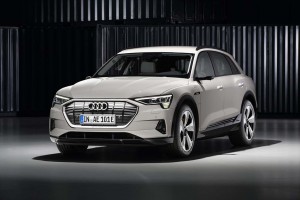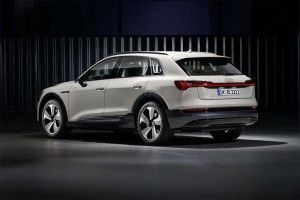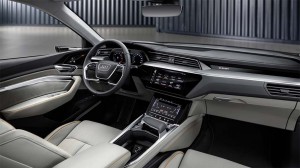
Audi was ready to take on the industry leader, Tesla, with the all-new e-tron, which will be delayed four weeks.
Audi will delay the launch of its first long-range electric vehicle, the e-tron, by about four weeks, the automaker confirmed, due to a software problem.
It would be the latest in a series of problems that repeatedly pushed back the unveiling of the e-tron, which Audi finally unveiled in mid-September. The German automaker had initially hoped to reveal the electric SUV earlier in the year, ahead of archrival Mercedes-Benz, which revealed its own battery-powered ute, the EQC two weeks earlier.
According to a report by the Reuters news service, Audi blamed a “software development issue,” the automaker needing to receive regulatory approval after modifying some of the code used to control the electric vehicle’s drivetrain.
The confirmation followed an earlier report by German newsmagazine Bild am Sonntag that suggested the issue could delay retail sales of the e-tron by several months.
(Audi goes electric, tackles Tesla with New e-tron Electric SUV. Click Here for the story.)

Audi's new e-tron sport-utility is the first of several battery-electrics the brand plans to unleash in the U.S.
Audi has offered a number of hybrid and plug-in models during the last few years, but the e-tron is its first pure battery-electric vehicle, or BEV.
At a base price of $76,000, e-tron will come with a 95 kilowatt-hour lithium-ion battery, slightly smaller than the highest-power version of the Tesla Model X , the P100D, with a 100 kWh pack. While the German maker is waiting for official numbers from the EPA, Tesla’s Model X 100D can deliver an estimated 295 miles per charge.
The e-tron’s battery pack will drive two electric motors, one on each axle creating what is sometimes referred to as a through-the-road all-wheel-drive system. Together, the motors will produce up to 355 horsepower and 414 pound-feet of torque, and will be able to launch the electric SUV from 0 to 60 in about 5.5 seconds. Top speed is rated at 124 mph.
Audi plans to add a number of additional BEVs during the coming years as it moves away from the diesel technology that caused so much trouble for both the luxury brand and its parent, the Volkswagen Group. Former Audi CEO Rupert Stadler is currently being held in a German jail facing charges stemming from the attempted cover-up of the company’s diesel emissions scandal.
(Click Here for more about Audi sparking race for fastest EV with debut of PB 18 e-tron.)
By 2025, the Volkswagen Group’s various brands plan to offer an estimated 50 pure electric models worldwide.

While all-new on the outside, the new e-tron ute has all of the luxury interior appointments one expects from an Audi.
The launch of the e-tron marks the first step and positions Audi in a head-to-head competition with electric vehicle pioneer Tesla. It also goes up against the new Mercedes EQC, though the Stuttgart-based subsidiary of Daimler AG is targeting a lower price-point with its battery-SUV. The Audi e-tron is also competing in an emerging market segment that includes Jaguar’s first all-electric model, the I-Pace SUV.
According to the Bild am Sonntag report, the problem with e-tron’s software is just one of the issues Audi is facing. The publication also indicated that the carmaker is in the midst of tense negotiations with battery manufacturer LG Chem. The South Korean company wants to raise the price of the e-tron’s batteries by 10% due to high demand.
Battery prices have fallen sharply throughout the past decade, in part due to improvements in manufacturing systems, but also due to low demand. The cells used for the Chevrolet Bolt EV, for example, now cost about $150 per kWh, down from around $1,000 for similar batteries at the beginning of the decade. But as demand grows, suppliers like LG Chem appear to be pressing for higher prices.
The other challenge is one of supply. During a news conference at the Paris Motor Show earlier this month, Daimler CEO Dieter Zetsche indicated that his company could face production issues if demand for the new EQC exceeds initial plans, largely due to a shortage of batteries.
Mercedes is setting up a new battery line in Alabama to supply its assembly plant there, something that could overcome future supply issues.
(To see more about Mercedes and its new EQC electric SUV, Click Here.)
It is unclear what Audi might do to address its own problems with battery supplies and the demand for higher pricing.
